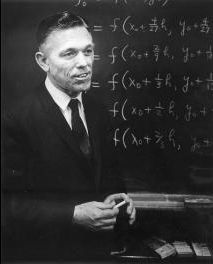Eugene Baylis Shanks (1913-1992)
Eugene Baylis Shanks was born in Sumrall, Mississippi, on November 17, 1913, the youngest of five children. He grew up in Mississippi and graduated magna cum laude from Millsaps College in 1938. His study at Millsaps was interrupted by service in the Civilian Conservation Corp for several years. Shanks came to Nashville and began graduate work at Vanderbilt while teaching at Wallace School. He received his M.A. from Vanderbilt in 1940 and his Ph.D. from the University of Illinois in 1947. Again at Illinois his study was interrupted, this time by over four years of service in the Army Air Force during World War II. He attained the rank of captain before being discharged in 1945. Shanks joined the Vanderbilt faculty as an assistant professor in 1947, and was promoted to associate professor in 1949 and to professor in 1954. He became professor emeritus in 1979.
While Shanks was a graduate student at Vanderbilt, one of his classmates was Mary Olivia Harris. They fell in love and were married on June 13, 1940. Baylis and Olivia Shanks have two children, Judith Olivia Shanks Denton and Eugene Baylis Shanks, Jr. Judy and Gene both graduated from Vanderbilt, and both have since received Ph.D. degrees from other institutions. They have been active in the alumni affairs of Vanderbilt (each has served on the alumni board), and Gene is now a member of the Vanderbilt Board of Trust. In 1984 they honored their parents by endowing the lecture series known as The Shanks Lectures. This series has played a prominent role in the work of the Department of Mathematics by bringing in outstanding mathematicians with a variety of specialties.
Shanks served the university and the Department of Mathematics in many ways. He was chairman of the department from 1956 to 1969. On returning to Vanderbilt as a faculty member in 1947, Shanks urged the administration to initiate a Ph.D. program in mathematics. His efforts were successful, and he directed the research of the first two persons to receive Ph.D.’s in mathematics at Vanderbilt. The first was James Robert Wesson, who later served as a faculty member in the department.
Early on, Shanks recognized the importance of computers, and he served as chairman of the committee that established the first computer center at Vanderbilt. He received grants from the ESSO Foundation to conduct in-service institutes for high school teachers and from the National Science Foundation to conduct summer institutes.
Shanks felt that the NASA presence in Huntsville was both an opportunity and an obligation for Vanderbilt. He received several grants from NASA, not only to support his work but also the work of other faculty members and of graduate students.
He chaired many committees at Vanderbilt (for example, committees on summer session, natural science, and educational policy), and was a member of the Faculty Council and the Faculty Senate. He was very active in professional organizations, serving The Mathematical Association of America as a visiting lecturer and consultant and as chairman of the Southeastern section. He was a charter member of the Tennessee Mathematics Teachers Association and served as its president.
Shanks did his Ph.D. research in Riemannian geometry, and he liked all geometry (for example, he directed a dissertation in finite geometry). But it is fair to say that he loved to work in the foundations of mathematics. In the analysis course he taught for many years, he always started with the work of Frege, Russell, Peano and others in the foundations. Also, he directed dissertations in algebra. But during his work with NASA, he shifted gears and became an expert in numerical analysis and made significant contributions to that field by replacing the standard Runge-Kutta formulas with more accurate formulas that required less time in NASA computations. The breadth of his mathematical interests was embodied in his lecture on the occasion of his retirement; it was entitled “From Set Theory to Numerical Analysis.”
Shanks was a religious man. He loved the First Baptist Church in Nashville and served it as a deacon, Sunday school teacher, and class president. His community activities included the Kiwanis Club and coach of Knot-Hole baseball.
Shanks was endowed with a fundamentally optimistic nature. He was optimistic about the mission of Vanderbilt and about the role of the Department of Mathematics and his own role in that mission. He was a vigorous man physically, being a strong tennis player for most of his life. He fell victim to cruel disease, but his basic optimism allowed him to bear his disability with dignity and grace and to say “everything will be all right.”
Baylis and Olivia Shanks were generous in sharing their home with the Vanderbilt community. Members of the mathematics faculty, Master of Arts in Teaching Program candidates (Olivia was associate director of the MAT program), and generations of graduate students and undergraduate mathematics majors fondly remember the good food and the good fellowship of parties at the Shanks home.
Shanks was dedicated to Vanderbilt and to doing all that he could to help Vanderbilt serve its students and serve the wider community. We are grateful for his life, and Vanderbilt is certainly a better place because he came this way.
